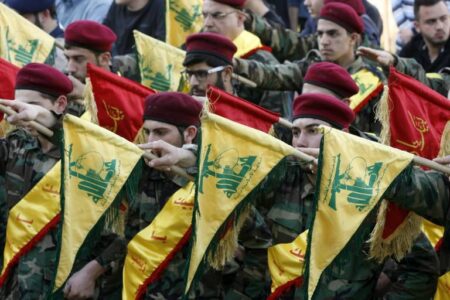
Hezbollah terrorist group still has a knife at Lebanon’s throat
Lebanon’s postwar hopes of becoming a free and prosperous nation died smoldering in a mangled crater of seared flesh and jagged metal on the Beirut waterfront. The devastating bomb blast that tore through the Beirut coast didn’t just rip the fragile fabric of Lebanese society apart—it permanently mutilated it beyond all recognition.
But this did not happen in 2020; it happened in 2005. That time, however, it was no act of criminal negligence or corruption but a premeditated murder.
On Feb. 14, 2005, a suicide bomber detonated a Mitsubishi Canter pickup truck loaded with over 2,000 pounds of TNT next to the convoy of the former Lebanese Prime Minister Rafik Hariri, murdering him and 21 other people.
On Tuesday, after more than 15 years of turmoil, bloodshed, and destitution, as well as the murder of one of the men pursuing the killers, the first-ever international court tribunal established to prosecute terrorist crimes returned a verdict that no one in Lebanon ever doubted: Hariri was assassinated by senior Hezbollah operatives.
But justice has come under absurd circumstances. The tribunal, which spent more than $1 billion and took 11 years to return one guilty verdict (out of four suspects on trial in absentia), never had the remit to investigate Hezbollah as an organization, and its final verdict was undermined before it had even been read out by the demonstrably ridiculous statement that the court had seen “no evidence that the Hezbollah leadership had any involvement” in the assassination, before returning a guilty verdict for a senior Hezbollah operative, Salim Ayyash. Ayyash was found guilty of co-conspiring to murder Hariri with Mustafa Badreddine, Hezbollah’s second-in-command, whose case at the tribunal was dropped following his death in Syria in 2016.
Hezbollah, a Shiite paramilitary organization funded by Iran, has always officially denied responsibility for the bombing, just as it has always denied responsibility for assassinating Samir Kassir, Wissam al-Hassan, George Hawi, and Gebran Tueni, among dozens of other political opponents, and for the deaths of hundreds of innocent bystanders from these bombings.
In Lebanon, prominent critics of Hezbollah and their allies in Syria’s Assad regime get killed in car bombs, Hezbollah denies responsibility, and the nation is expected to move on as if nothing happened and mysterious car bombs are just one of those unexplained quirks of life rather than a clear message, etched in blood, for all to understand.
Hezbollah’s most senior operatives do not act independently from the organization’s leadership. This tribunal and verdict, as flawed and toothless and disappointing as they have been for many Lebanese, has at the very least hammered the nail into the coffin of Hezbollah’s charade of plausible deniability.
As of publication time, Hezbollah’s leader Hassan Nasrallah has not responded to the guilty verdict against Ayyash, a man he had previously called an “honorable” resistor alongside the other indicted Hezbollah members in a speech in 2011. After previously vowing to “cut off” the hand of anyone who tried to arrest Ayyash or his co-conspirators, whose whereabouts remain unknown, it is unlikely Nasrallah will accept even a court decision that went out of its way to acknowledge there was no paper trail leading directly to his leadership.
A guilty verdict for Badreddine would have been harder to stomach for Hezbollah, but like Nasrallah’s critics whose cars mysteriously blew up, Badreddine was killed by a conveniently unexplained blast and could not be prosecuted by the tribunal because he was dead, another loose end tied up.
Hezbollah’s gaslighting of the Lebanese people is brutally obvious. The day before the verdict was issued, Hezbollah supporters had been posting photos of Badreddine online alongside the hashtag “whomever we killed deserved it.” Immediately after the court convicted him for murdering 22 people, a banner was raised by Hezbollah supporters in Ayyash’s hometown honoring him as a “proud son of the resistance.”
Source: Foreign Policy





